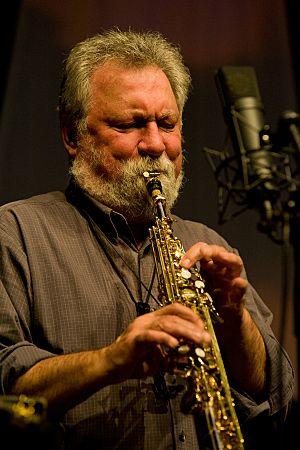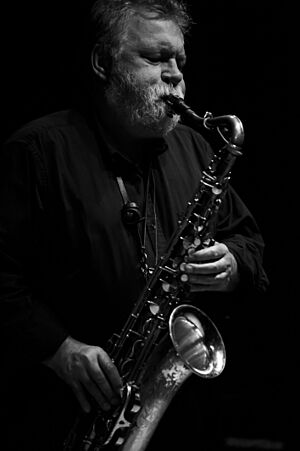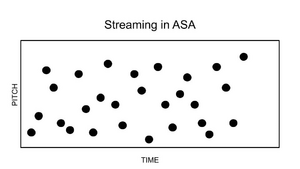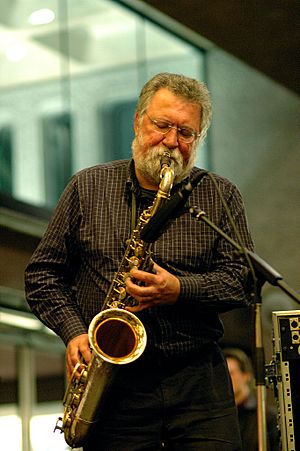Evan Parker facts for kids
Quick facts for kids
Evan Parker
|
|
|---|---|

Moers Festival, 2012
|
|
| Background information | |
| Birth name | Evan Shaw Parker |
| Born | 5 April 1944 Bristol, England |
| Genres | free improvisation, free jazz |
| Occupation(s) | Musician |
| Instruments | Saxophone |
| Labels | Psi, Emanem, Clean Feed, Incus, Leo, Rune Grammofon, Tzadik |
| Associated acts | Irene Schweizer, Barry Guy and his London Jazz Composers' Orchestra, Cecil Taylor, Anthony Braxton, Berlin Contemporary Jazz Orchestra, Globe Unity Orchestra |
Evan Shaw Parker, born on April 5, 1944, is a British saxophone player. He is known for playing a unique style of music called free improvisation. This means he makes up the music as he plays, without following a set score.
Evan Parker has worked with many other musicians. He was very important in creating and developing free jazz and free improvisation in Europe. He also invented or greatly improved many special ways of playing the saxophone. One music critic, Ron Wynn, called him "among Europe's most innovative and intriguing saxophonists."
Contents
Early Musical Journey
Evan Parker first found inspiration from a saxophone player named Paul Desmond. Soon after, he discovered the music of John Coltrane. Coltrane became the biggest influence on Parker's music throughout his career. Other important early influences were free jazz artists like Cecil Taylor, Albert Ayler, and Jimmy Giuffre. Later in his career, Parker also showed influences from "cool jazz" saxophone players. He even recorded tribute songs for Warne Marsh and Lee Konitz.
Starting His Career
In 1966, Evan Parker moved to London. He quickly became part of the city's improvised music scene. This scene was centered around a place called the Little Theatre Club. He joined a group called the Spontaneous Music Ensemble, led by John Stevens.
Along with guitarist Derek Bailey, Parker quickly became a leader in the improvised music movement. This movement spread across London and all of Europe. One of his longest musical partnerships was with German pianist Alexander von Schlippenbach. Parker joined Schlippenbach's trio in 1970.
Playing Solo Saxophone
Evan Parker is perhaps most famous for his solo performances. In these shows, he plays the saxophone all by himself. At first, he didn't think much of solo playing. He felt it was too much like traditional music. But then, he saw Derek Bailey's solo guitar playing. This inspired Parker to try playing alone.
For his solo shows, Parker mainly uses the soprano saxophone. He creates a special effect called "auditory streaming." This is where he uses very high and very low notes at the same time. It makes it sound like more than one instrument is playing, which Parker calls "pseudo-polyphony." He achieves this by using techniques like multiphonics (playing more than one note at once) and circular breathing (breathing in while still blowing out). He also uses special fingerings and tonguing methods.
Exploring Electronic Music
Evan Parker has been interested in electronic music for a long time. He started experimenting with it early in his career. He often invites other musicians to work with him. These collaborators, like Phil Wachsmann or Lawrence Casserley, process his saxophone sounds electronically. This creates a changing sound world around his playing.
His Electro-Acoustic Ensembles are a great example of this work. He also has a project called Trance Map with Matthew Wight. They have performed live shows across Europe and the US. They also released recordings under the Trance Map+ name.
Later Career and Collaborations
Evan Parker has recorded many albums. He has released music as a solo artist and as a band leader. He has also played with many famous musicians. Some of these include Peter Brötzmann, Michael Nyman, Anthony Braxton, Cecil Taylor, and John Zorn.
Two of his most important groups were with pianist Alexander von Schlippenbach and drummer Paul Lovens. Another key group was a trio with bassist Barry Guy and drummer Paul Lytton. For Parker's 50th birthday, both of these bands played at a concert in London. The recordings from this concert were released as the 50th Birthday Concert album.
In 1970, Parker, Bailey, and Tony Oxley started their own record label called Incus Records. Later, Parker started his own label, Psi Records. This label releases music through Martin Davidson's Emanem Records.
From 1999 to 2007, Parker helped organize and play in the Free Zone at the Appleby Jazz Festival. This festival was held in Cumbria, England. The recordings from these events were released on his Psi record label.
Even though Parker mainly plays free improvisation, he has also played in more traditional jazz settings. He performed with Charlie Watts's big band and Kenny Wheeler's groups. He also played in Gavin Bryars's recording After the Requiem.
Parker also contributed to David Sylvian's albums Manafon and Died in the Wool.
In April 2024, Evan Parker celebrated his 80th birthday. He had three concerts at Café Oto in London. He also released a 4-CD set of solo performances called The Heraclitean Two-Step, etc. with a book.
Pop Music Appearances
Evan Parker has even appeared in pop music. He played on Scott Walker's album Climate of Hunter. He also played on dub-influenced albums with Jah Wobble. He worked with the drum n bass duo Spring Heel Jack and the rock group Spiritualized.
He also played saxophone on the B-side of a UK number-one hit song called "Dizzy" in 1991. This song was by Vic Reeves and The Wonderstuff. During one of his saxophone solos, you can hear Vic shout, "Pack it in, Parker!"
Parker has also made notable recordings with Robert Wyatt.
Images for kids
Selected Recordings
Evan Parker has released many recordings throughout his career. Here are a few examples:
- Saxophone Solos (Incus, 1976)
- The Snake Decides (Incus, 1986)
- 50th Birthday Concert (Leo, 1994)
- Toward the Margins (ECM, 1996)
- The Moment's Energy (ECM, 2007)
See also
 In Spanish: Evan Parker para niños
In Spanish: Evan Parker para niños
 | Roy Wilkins |
 | John Lewis |
 | Linda Carol Brown |










